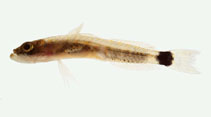| Family: |
Xenisthmidae (Collared wrigglers) |
| Max. size: |
2.07 cm SL (male/unsexed); 2.08 cm SL (female) |
| Environment: |
demersal; marine; depth range 12 - 26 m |
| Distribution: |
Western Central Pacific: Palau. |
| Diagnosis: |
Dorsal spines (total): 7-7; Dorsal soft rays (total): 11-11; Anal spines: 1-1; Anal soft rays: 10-10. Diagnosis: Distinguished from its congeners in having 15-16 pectoral fin-rays (vs. 18); cephalic lateralis pore P absent (vs. present); head, nape, ventral abdomen, and dorsal midline of caudal peduncle naked (vs. scaled); and caudal peduncle with a large, black blotch (vs. none) (Ref. 56733). |
| Biology: |
Small, sand-diving gobioids; inhabits drop-off with caves and ledges, silty sandy shelves and slopes, with hydroids, sea fans and a variety of hard corals and some Halimeda (Ref. 56733). |
| IUCN Red List Status: |
Data deficient (DD); Date assessed: 12 March 2015 Ref. (130435)
|
| Threat to humans: |
harmless |
Source and more info: www.fishbase.org. For personal, classroom, and other internal use only. Not for publication.

